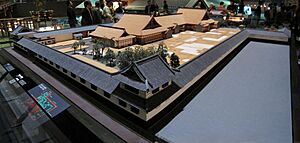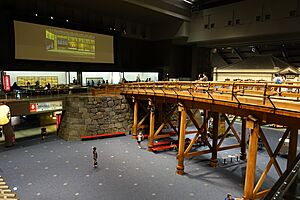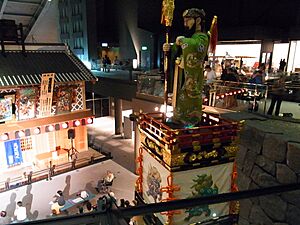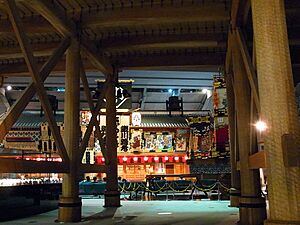Edo-Tokyo Museum facts for kids
| 江戸東京博物館 | |
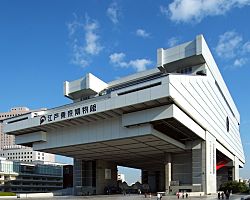
Entrance of the Museum
|
|
| Established | 1993 |
|---|---|
| Location | 1-4-1 Yokoami, Sumida, Tokyo, Japan |
| Visitors | 1,876,205 (2015) |
The Edo-Tokyo Museum (江戸東京博物館) is a special history museum in Tokyo, Japan. It opened in March 1993. The museum's main goal is to help people understand the rich history and culture of Tokyo. It shows how the city changed from its old name, Edo, to the modern Tokyo we know today.
Inside, you can see amazing models of old Edo and Tokyo. These models show what the city looked like from 1590 all the way up to 1964. The museum was the first of its kind built just to tell the story of Tokyo's past. Some of the most exciting things to see include a life-size copy of the Nihonbashi bridge. This bridge was once the main entrance to Edo. There are also detailed scale models of towns and buildings from different time periods in Japan's history. You can even see a model of the famous Nakamuraza theatre.
The museum building itself is very interesting. It was designed by a famous architect named Kiyonori Kikutake. The building is 62.2 meters tall and looks like an old Japanese rice storehouse. It is even the same height as the old Edo Castle. The museum closed for renovations in April 2022 and is still undergoing work. It is scheduled to reopen in 2026.
Contents
Exploring Tokyo's Past: What You Can See
The Edo-Tokyo Museum is like a time machine! It helps you discover how people lived in Tokyo long ago. The museum focuses on the daily lives of ordinary citizens.
Journey Through Time: Edo to Showa Eras
The museum's main exhibits are on the fifth and sixth floors. Here, you can explore different periods of Tokyo's history:
- Edo Period: Learn about Edo, which was the capital city from 1603 to 1868. See how people lived, worked, and played.
- Meiji Era: Discover how Edo changed into Tokyo during the Meiji era (1868-1912). This was a time of big changes for Japan.
- Shōwa Era: See what Tokyo was like during the Shōwa era (1926-1989), including how it rebuilt after difficult times.
Famous Replicas and Models
One of the coolest parts of the museum is its life-size and scale models.
- Nihonbashi Bridge: Walk across a full-size copy of the Nihonbashi bridge. This bridge was a very important landmark in old Edo.
- Town and Building Models: See incredibly detailed small models of entire towns and important buildings. These models show you what streets and homes looked like centuries ago.
- Nakamuraza Theatre: Explore a model of the Nakamuraza theatre. This was a famous place for traditional Japanese performances.
The Museum Building: A Unique Design
The Edo-Tokyo Museum building is a landmark itself. Its design tells a story about Japanese culture.
How the Building Looks
The architect, Kiyonori Kikutake, wanted the building to show off Japanese culture.
- It looks like a traditional Japanese rice storehouse. These storehouses were built high off the ground to protect the rice.
- The outside of the building is a whitish-silver color. This color was inspired by the roofs of old temples in Kyoto, which reflect sunlight.
- The roof-like shape of the building also comes from old Japanese temples.
Inside the Museum's Structure
The museum has eight floors. One floor is underground, and seven floors are raised high above the ground.
- The building stands on four huge columns, creating an open space underneath.
- A bright red escalator takes visitors from the ground level up to the main entrance on the third floor.
- The first floor has a museum shop and restaurants.
- The seventh floor has a large library. This library holds many books and items about the history of Edo and Tokyo.
Protecting the Exhibits
The museum is built to protect its valuable items.
- It has special springs that help absorb movement from vibrations or earthquakes.
- These springs can move up and down by 3.5 inches to keep the building stable.
See also
- Japanese Instrument of Surrender § Current locations


